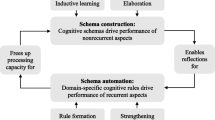Abstract
Rapid technological advances and concern for patient safety have increased the focus on simulation as a pedagogical tool for educating health care providers. To date, simulation research scholarship has focused on two areas; evaluating instructional designs of simulation programs, and the integration of simulation into a broader educational context. However, these two categories of research currently exist under a single label—Simulation-Based Medical Education. In this paper we argue that introducing a more refined nomenclature within which to frame simulation research is necessary for researchers, to appropriately design research studies and describe their findings, and for end-point users (such as program directors and educators), to more appropriately understand and utilize this evidence.
Similar content being viewed by others
References
Bligh, J., & Bleakley, A. (2006). Distributing menus to hungry learners: Can learning by simulation become simulation of learning? Medical Teacher, 28(7), 606–613. doi:10.1080/01421590601042335.
Cook, D. A. (2010). One drop at a time: Research to advance the science of simulation. Simulation in Healthcare, 5(1), 1–4.
Cook, D. A., Bordage, G., & Schmidt, H. G. (2008). Description, justification and clarification: A framework for classifying the purposes of research in medical education. Medical Education, 42(2), 128–133. doi:10.1111/j.1365-2923.2007.02974.x.
Cook, D. A., Hamstra, S. J., Brydges, R., Zendejas, B., Szostek, J. H., Wang, A. T., et al. (2013). Comparative effectiveness of instructional design features in simulation-based education: Systematic review and meta-analysis. Medical Teacher, 35(1), e844–e875.
Cook, D. A., Hatala, R., Brydges, R., Zendejas, B., Szostek, J. H., Wang, A. T., et al. (2011). Technology-enhanced simulation for health professions education: A systematic review and meta-analysis. JAMA, the Journal of the American Medical Association, 306(9), 978–988. doi:10.1001/jama.2011.1234.
Dieckmann, P., Phero, J. C., Issenberg, S. B., Kardong-Edgren, S., Østergaard, D., & Ringsted, C. (2011). The first research consensus summit of the society for simulation in healthcare. Simulation in Healthcare, 6(7), S1–S9. doi:10.1097/SIH.0b013e31822238fc.
Dubrowski, A. (2005). Performance versus learning curves: What is motor learning and how is it measured? Surgical Endoscopy, 19(9), 1290. doi:10.1007/s00464-004-8261-y.
Forscher, B. K. (1963). Chaos in the brickyard [Letter to the Editor]. Science, 142, 339.
Gaba, D. M. (2011). Training and nontechnical skills: The politics of terminology. Simulation in Healthcare, 6, 8–10.
Glavin, R. J. (2011). Skills, training, and education. Simulation in Healthcare, 6, 4–7.
Haji, F., Morin, M. P., Parker, K. (2013). Re-thinking program evaluation in health professions education: beyond ‘did it work’? Medical Education, 47, 342–351.
Issenberg, S. B. (2006). The scope of simulation-based health care education. Simulation in Healthcare, 1(4), 203–208. doi:10.1097/01.SIH.0000246607.36504.5a.
Issenberg, S. B., McGaghie, W. C., Petrusa, E. R., Lee Gordon, D., & Scalese, R. J. (2005). Features and uses of high-fidelity medical simulations that lead to effective learning: A BEME systematic review. Medical Teacher, 27(1), 10–28.
Issenberg, S. B., Ringsted, C., Østergaard, D., & Dieckmann, P. (2011). Setting a research agenda for simulation-based healthcare education. Simulation in Healthcare: The Journal of the Society for Simulation in Healthcare, 6(3), 155–167. doi:10.1097/SIH.0b013e3182207c24.
Kirkpatrick, D. L. (1998). Evaluating training programs: The four levels (2nd ed.). San Francisco: Berrett-Koehler Publishers.
McGaghie, W. C., Issenberg, S. B., Petrusa, E. R., & Scalese, R. J. (2006). Effect of practice on standardised learning outcomes in simulation-based medical education. Medical Education, 40(8), 792. doi:10.1111/j.1365-2929.2006.02528.x.
McGaghie, W. C., Issenberg, S. B., Petrusa, E. R., & Scalese, R. J. (2010). A critical review of simulation-based medical education research: 2003–2009. Medical Education, 44(1), 50–63. doi:10.1111/j.1365-2923.2009.03547.
Molenda, M. (2003). In search of the Elusive ADDIE Model. Performance Improvement, 42(5), 34–37.
Nestel, D., Walker, K., Simon, R., Aggarwal, R., & Andreatta, P. (2011). Nontechnical skills: An inaccurate and unhelpful descriptor? Simulation in Healthcare, 6, 2–3.
Patton, M. Q. (1994). Developmental evaluation. Evaluation Practice, 15(3), 311–319.
Reznick, R. K., & MacRae, H. (2006). Teaching surgical skills–changes in the wind. The New England Journal of Medicine, 355(25), 2664–2669. doi:10.1056/NEJMra054785.
Scerbo, M. W., Murray, W. B., Alinier, G., et al. (2011). A path to better healthcare simulation systems: Leveraging the integrated systems design approach. Simulation in Healthcare, 6, S20–S23. doi:10.1097/SIH.0b013e318227cf41.
Weinger, M. B. (2010). The pharmacology of simulation: A conceptual framework to inform progress in simulation research. Simulation in Healthcare, 5(1), 8–15.
Ziv, A., Wolpe, P. R., Small, S. D., & Glick, S. (2003). Simulation-based medical education: An ethical imperative. Academic Medicine, 78(8), 783–788.
Acknowledgements
This article is the result of a collaborative effort from the members of the LIFE Research Group. All authors contributed equally to this work.
Author information
Authors and Affiliations
Corresponding author
Rights and permissions
About this article
Cite this article
Haji, F.A., Hoppe, D.J., Morin, MP. et al. What we call what we do affects how we do it: a new nomenclature for simulation research in medical education. Adv in Health Sci Educ 19, 273–280 (2014). https://doi.org/10.1007/s10459-013-9452-x
Received:
Accepted:
Published:
Issue Date:
DOI: https://doi.org/10.1007/s10459-013-9452-x




